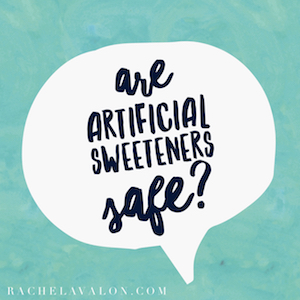For decades the concern over whether artificial sweeteners cause cancer has been hotly debated, especially since some artificial sweeteners have been shown to cause cancer in rats and their offspring. Cancer hasn’t been the only safety and health concern though…
Here is a basic list of side effects from artificial sweeteners that have been reported:
- Headaches
- Migraines
- Altered taste buds
- Dizziness
- Nausea
- Bloating
- Diarrhea
- Rashes
- Change in vision
- Change in heart rate
NOTE: Aspartame, one of the best-known artificial sweeteners, is highly toxic to people who have a condition called phenylketonuria (PKU.)
The data on all the potential side effects from artificial sweeteners is limited. However, studies have shown that consuming artificial sweeteners can actually stimulate carbohydrate cravings, fat storage, and lead to weight gain.[1] So really, what’s the point? Do we study the impact of these sugar substitutes more extensively or can we simply acknowledge that artificial sweeteners are chemicals and we aren’t designed to ingest them?
Of course, advertising can easily dominate decision-making. Since artificial sweeteners are calorie-free and typically bypass part of the digestive process without spiking insulin levels, the demand has been rising. In fact, dieters, diabetics, and corporate efforts have already helped make the artificial sweeteners market a $1.5 billion market.[2] By 2024, it’s projected to reach $2.70 billion.[3] Addressing Type 2 Diabetes and excessive weight doesn’t require artificial sweeteners though.
To avoid artificial sweeteners (and other sabotaging sweeteners), reading food and beverage labels and ingredient lists is a must. Artificial sweeteners may be listed by their number, their chemical name, or by their brand name (which can be entirely or partly derived from the artificial sweetener.)
Common food and beverage marketing terms that can contain artificial sweeteners:
- Diet
- Light or Lite
- Low sugar
- Low fat
Common artificial sweeteners include:
- Aspartame (E951)
– Also known as APM, L-alpha-aspartyl-L-phenylalanine methyl ester
– Brand names known to include it as an ingredient:
NutraSweet, Equal, Spoonful, Equal-Measure, Canderel,
Benevia, AminoSweet, NatraTaste
- Aspartame-acesulfame Salt (E962)
– Brand names known to include it as an ingredient:
Twinsweet
- Acesulfame Potassium (E950)
– Also known as Acesulfame K, Ace K, ACE
– Brand names known to include it as an ingredient:
Sunett, Sweet One, Sweet & Safe
- Saccharin (E954)
– Also known as Sodium Saccharin, calcium saccharin, acid saccharin,
potassium saccharin
– Brand names known to include it as an ingredient:
Sweet’N Low, Necta Sweet, Sugar Twin
- Sucralose (E955)
– Brand names known to include it as an ingredient:
Splenda
- Neotame (E961)
NOTE: Many of the artificial sweeteners in commerce are marketed globally under additional brand names.
Holistic Secret: It is relatively common for artificial sweeteners to be derived from or paired with GMOs such as genetically modified corn or beet sugar. By prioritizing certified organic foods, beverages, and sweeteners, you can reduce your exposure to genetically modified organisms.
Artificial sweeteners can be found in:
- Sodas and other carbonated drinks
- Chewing gum
- Mints
- Condiments
- Yogurts
- Canned foods
- Children’s chewable supplements
- Children’s electrolyte beverages
- Jams and jellies
- Salad dressings
- Breads and English muffins
- Baked goods
- Candy
- Fruit juice
- Puddings and gelatin desserts
- Frozen desserts such as ice cream
Some may argue that the FDA considers most artificial sweeteners as GRAS (generally recognized as safe), but think of all the products that were once deemed safe by the Food and Drug Administration and then later pulled off the market.
Be on the lookout as well for artificial sweeteners approved in other countries or seeking FDA approval such as:
- Alitame
- Cyclamate
- Neohesperdine
- Thaumatin
- Advantame
- Alitame (Aclame)
Artificial sweeteners may have become socially accepted as the norm by millions of people. However, it’s time for us, every food and beverage manufacturer, restaurant, grocery store, school, hotel, hospital, buildings with vending machines, and airlines to challenge that norm.
All in all, why would take the chance to give our bodies more work to do by processing something unnatural that potentially puts our short-term or long-term health at risk? Why would we want to perpetuate the chemical manufacturing involved with artificial sweeteners and the impact that has on the health of the planet?
You don’t need artificial sweeteners to lose weight, maintain a healthy weight, or manage Type 2 Diabetes. Mind-body health can be supported with a whole foods diet, stress resilience, and effective strategies for healthy habits. Learn more with Smarter Sweeteners – Choosing Natural Alternatives.
My mission: As a Holistic Health Coach & Eco Expert, I’m dedicated to leading you straight to the core of what it takes to enjoy a new level of vitality, desired weight loss, sustainability, and detoxification. Enjoy my transformative programs and experience true health with true purpose!
[1] Merocla.com. “How Artificial Sweeteners Confuse Your Body into Storing Fat and Inducing Diabetes.” December 23, 2014. Accessed September 30th, 2015. http://articles.mercola.com/sites/articles/archive/2014/12/23/artificial-sweeteners-confuse-body.aspx
[2] PRWeb.com. “Global Artificial Sweeteners Market to Reach US$1.5 Billion by 2015, According to a New Report by Global Industry Analysts, Inc.” September 28, 2010. Accessed September 30th, 2015. http://www.prweb.com/releases/artificial_sweeteners/aspartame_sucralose/prweb4563584.htm
[3] MordorIntelligence.com “Artificial Sweeteners Market – Growth, Trend and Forecast (2019-2024)”. Accessed June 27th, 2019. https://www.mordorintelligence.com/industry-reports/artificial-sweeteners-market

Leave a Reply